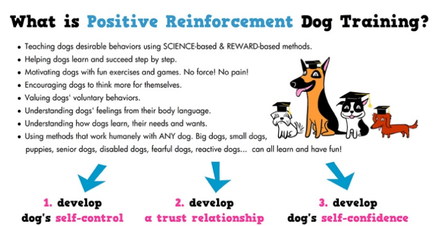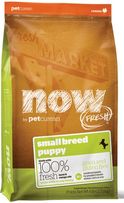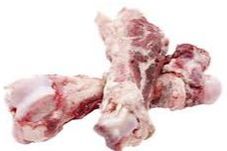Shopping List for Your New Puppy:
Training:
|
Training classes
It's a great idea to enroll your puppy in obedience classes, especially if it is your first dog. Before bringing your puppy home, start looking for dog trainers in your area. Most will offer group classes, which can be a great opportunity to socialize your puppy in a controlled environment and teach them to focus on you amidst distractions. Look specifically for trainers who teach clicker training and positive reinforcement. Our puppies have a head-start in these areas and learn best when these methods are used. Feel free to contact us for recommendations. |
|
Clicker - We start our puppies on clicker training and encourage our puppy owners to continue the same training. Clickers can be bought off of Amazon or local pet stores, or customized at The Doggone Good Clicker Company. Zak George Dog Training book - We highly recommend Zak George and his training techniques. This book is chock-full of information. It's an excellent resource for choosing a puppy, how to prepare your family and household for the new arrival, what to expect, house training tips, trick training, and more. He also has videos on YouTube: upbeat, informative, and easy-to-understand guidelines for all ages. Zak George now offers a free 30-day Dog Training program online. Recommended for both new and experienced puppy owners. Learn more here: pupford.com/30-day-perfect-pup-with-zak-george/ Collar: Toy Poodles typically need a collar around 9" long. Make sure it is durable and adjustable. I prefer buckle or belt style collars. Both nylon and leather work well. I would recommend purchasing an inexpensive collar to begin with, until after your puppy is full-grown and no longer teething. Harness: As harnesses range in all sizes, shapes, and styles, it is best to find one for your puppy after taking them home, so you can test the harness on the puppy to make sure it fits properly. ID tag: These can be purchased at pet stores or ordered online. Print a message saying something like, "If I'm out, I'm lost!" and add your phone number and/or email. Leash: A 6-foot leash works perfectly. Nylon, rolled leather, braided, etc.--anything comfortable and sturdy. |
|
Toys:
|
The Kong. A very popular toy in our house. Poodles are retrievers, and there is nothing more exciting than a toy that bounces everywhere! Kongs can be used for crate training, curbing separation anxiety, and just plain fun. Their hollow center allows you to fill it with food or treats such as peanut butter, kibble, pumpkin, and much more, and can be frozen to give the dog more time to enjoy it. Toy Poodles need the Small size Kong. They can be purchased from Amazon, PetsMart, etc.
BarkBox. Another favourite to our Poodles. BarkBox is a monthly subscription that sends you a box filled with an assortment of dog treats, toys, and a chewy. It's like Christmas day to our dogs! There are many other subscription boxes to choose from. Have an assortment. Your puppy will soon learn which toys he/she prefers. Try to pick at least one that fits in each of the following categories: - Durable rubber for chewing - Soft plush for snuggling, chasing, etc. - Squeaky, crinkly, or one that makes other noises. - Ball or other toy for throwing/chasing outdoors - Interactive puzzle toy or mind game (snuffle mat) |
|
Food:
|
We feed our dogs Petcurean's Now Fresh Puppy Food (small breed formula). Made and sourced in Canada. We will provide a sample with your puppy to last approximately a week, or until you switch him/her onto a different food of your choice. We can send you a list of recommended brands that our dogs have done well one, upon request. The amount of food your puppy eats will depend on size, energy level, individual metabolism, type of food, etc. Have at least 25 lbs on hand at all times.
|
Treats:
|
Training treats ~ For training, simple treats, such as cheese, lunchmeat, chicken, or freeze dried treats, work very well. Something soft and easy to break into little pieces. Experiment with different foods and find out what your puppy likes best.
Chews - Cow hooves, pig ears, raw bones, chicken/duck feet, and chicken necks are all great for puppies. These can be purchased at your local pet store or raw food distributor. |
Crate/X-Pens:
|
Crates are used for containing your puppy while you are unable to supervise them, to aid in housetraining, and provide a safe place for them to sleep during the night as they are being trained. Your puppy will be introduced to a crate before he/she comes home to help with a smooth transition. Depending on the size of your puppy, you will need either a Small or an X-Small size crate.
Dog Crate - Crates are used to aid in housetraining and to keep the puppy out of trouble and danger while you are not able to supervise them. I highly recommend keeping your puppy in a kennel during the night (until they are housetrained) and while you are away during the day (until they are done teething). A Small usually works well, but for puppies charting less than 5 lbs, X-Small crate is best. X-Pen ~ Exercise pens are great for puppies who aren't fond of crates, or simply to contain them but still allow them room to play. You may also attach a crate to the pen. |
|
Grooming:
|
Slicker Brush - A brush is important to keep your puppy's coat tangle free, and to distribute healthy oils throughout his/her coat.
Nail clippers - Nail maintenance is crucial, especially for young, developing puppies. Keeping their nails at an appropriate length will help their feet grow correctly and prevent arthritis and painful joints and ligaments in the future. There is a group on Facebook called Nail Maintenance for Dogs. A nail dremel is also a great investment. For dogs with sensitive feet, or who have had bad experiences with nail trims, a clipboard with sandpaper glued to one side can be used to keep the dog's nails short. Teach them to paw and dig at the board to wear down overgrown nails. Puppy Shampoo - Even if you take your Poodle to a groomer, it is still important to bathe and brush them regularly. Puppies especially need to be accustomed to these procedures. Dental Care - Toy Poodles, as well as other small breeds, are prone to tooth issues as they grow older. Daily, or even weekly brushings will reduce plaque and tartar build up and promote good oral health. Healthy chews, raw bones, and a good diet are a must. |
|
| puppy_shopping_list.odt |








